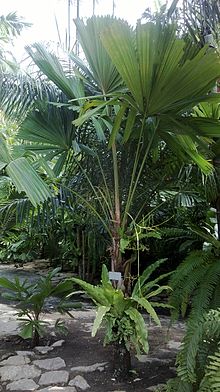en
names in breadcrumbs


Licuala is a genus of palms, in the tribe Trachycarpeae, commonly found in tropical forests of southern China, Southeast Asia, the Himalayas, New Guinea and the western Pacific Ocean islands.[1][2][3][4][5]
Licuala spp. are fan palms, with the leaves mostly circular in outline, sometimes undivided but more usually divided into wedge-shaped segments. Licuala acutifida is the source of cane for the walking stick nicknamed the Penang-lawyer by colonials, probably from the Malay phrase pinang liyar for a wild areca, although the term may also refer to the use of these canes as deadly knobkerries to assassinate litigious enemies.[6] Several species of Licuala have been transferred into a new genus Lanonia.[7]
Plants of the World Online currently (February 2021) includes 167 accepted species:[8]
 Licuala ramsayi
Licuala ramsayi Licuala is a genus of palms, in the tribe Trachycarpeae, commonly found in tropical forests of southern China, Southeast Asia, the Himalayas, New Guinea and the western Pacific Ocean islands.